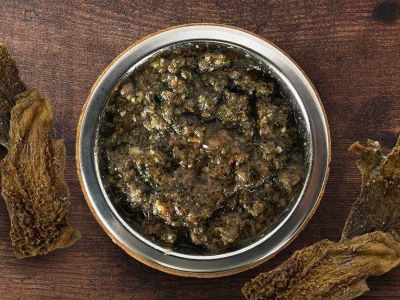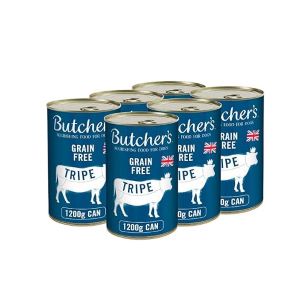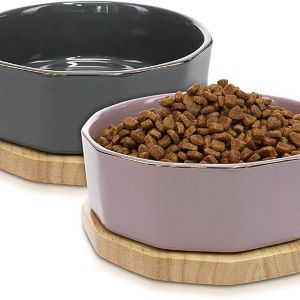Tripe, curious and often underestimated food in dog’s delicious world of food. While it may not be the most appealing sight for us humans but this delicacy is triumphant among our canine companions. But, is tripe good for dogs?

Let’s jump into their world and understand why tripe is so fascinating for dogs. What are the potential benefits and disadvantages we must keep in mind?
You Might Also Like:
Is Tripe Good for Dogs?
Tripe is a type of edible lining from the stomach of various animals like cows, sheep, goats and pigs. It is widely consumed by humans all around the world.
We can make tripe in many ways such as boiling, frying, stewing, or baking. Don’t mix it in some herbs, spices, and sauces. Some of the common tripes are:
- Green Tripe: It is raw and unprocessed tripe from the stomach of animals. It has green tints due to the grass and hay that animals ate. It is rich in enzymes, probiotics, and nutrients, a good snack alternative for dogs.
- White Tripe: This is bleached and cooked tripe sold around shops for human consumption. It has been cleaned of any impurities and fat. It is a white or pale colour. It contains less nutritional value compared to the green tripe.
- Honeycomb Tripe: As animals have multiple stomachs it comes from the second stomach chamber of cows mostly. It comes in a honeycomb-like pattern from its surface. It is most popular, used in soups, stews, or curries.
- Flat Tripe: This tripe comes from the first stomach of cows mainly. It has a flat and smooth texture. It can be tough and chewy.

If you want to feed tripe to your dog then choose green tripe over other tripes and choose beef tripe over other tripe, as they are more nutritional. Here are some more benefits of tripe:
Essential Nutrients and Vitamins
Tripe has various rich nutrients and vitamins like calcium, magnesium, zinc, iron, and vitamin B12. This helps in the dog’s overall health and well-being.
“Studies suggest that getting nutrients like B12 through food instead of supplements may increase the amount of the micronutrients you actually absorb. This helps your body use these vitamins and minerals more efficiently”, says the experts from WebMD.
Excellent Source of Protein
Tripe is an essential source of protein, that is a building block of muscles, bones, skin, hair, and other muscle tissues. Protein from tripe can help the dog to maintain a healthy immune system and metabolism.
It also has a good balance of amino acids, which are also components of protein. Tripe is also lower in phosphorous than other meats. Which makes it a good base for preparing a diet for dogs with reduced kidney function[1].

Natural Probiotic Effects
Tripe contains natural digestive aid and probiotics. Green tripe has Lactobacillus acidophilus, a type of bacteria that originates in an animal’s gut.
This helps to improve the dog’s gut health by controlling populations of harmful bacteria, absorbing more nutrients, and digesting food better[2].
Positive Effects on Skin and Coat Health
Tripe also affects a dog’s skin and coat health. Tripe contains omega-3 and omega-6 fatty acids, which are essential for a healthy coat. This may reduce itching, redness, and irritation.
Also helps to maintain the moisture and elasticity of the dog’s skin and coat. Keratin may help strengthen your dog’s hair.
Potential Risks and Concerns
As tripe has many benefits to a dog’s diet, there can be some potential risks too. Here are some of them:
- High-Fat and Calorie Considerations: Tripe consists of high fat and calories. It can provide your dog with energy and healthy fats, but in excess tripe can cause obesity and pancreatitis. You can adjust according to your dog’s weight and diet needs. Avoid feeding tripe to your dog if it has a history of digestive issues.
- Allergies and Sensitivities: Tripe can cause allergies too, if your dog has any intolerance that can get triggered too. You can introduce tripe gradually to your dog’s diet. Monitor for any sign of itching, vomiting, diarrhoea, or other discomforts.
- Bacterial Contamination: Tripe contains bacteria too, that can cause foodborne diseases, such as E. Coli and Salmonella. They can cause serious infections among dogs. You must always wash your hands and utensils after handling raw tripe. You should avoid feeding tripe to puppies and senior dogs, as their stomachs are not strong and they have weak immune systems.
- Balancing Other Components of the Dog’s Diet: You should feed dogs a balanced diet, Tripe is not a complete food for dogs. It should be supplemented with other meats, organs, bones, fruits and vegetables. You should also consult your vet before making any changes to your dog’s diet.

How to Feed Tripe to Your Dog?
Tripe can be good for your dog if you give it to them the right way. You may prefer a tripe that is fresh and clean, make sure it is not dirty. You can feed your dog raw or cooked tripe, but raw tripe may be more good in it.
Cut it into small pieces or mix it with other snacks. If you want to feed cooked tripe, then you can boil or steam it without any spices or seasonings. Let it cool down. Make him eat slowly to avoid chewing issues.
FAQs
Is White Tripe Good for Dogs?
Firstly, tripe is considered safe for canine consumption. It might be different compared to what a dog normally eats, which means feeding too much of it in a single sitting can lead to an upset stomach and maybe even vomiting. Whatever form you buy tripe in, it is safe for your dog to eat, even if it is white tripe.
How Much Tripe to Feed the Dog?
A good starting point is 2 – 3% of the dog’s healthy body weight is fed each day. For a 50-pound dog that would equate to about 1 to 1-1/2 pounds per day.
Can Dogs Eat Tripe Every Day?
It can be used as a daily additive to food or as a special treat. Green tripe is also perfect for pregnant or nursing dogs. We’ve already discussed that green tripe contains a good level of protein and this is vital to mum to help her support her puppies.
What Tripe Is Best for Dogs?
Simply put, green tripe is a superfood for dogs. Tripe is the nutrient-rich stomach lining of an animal – in this case, either lamb or beef – and the ‘green’ in front simply means it isn’t bleached or processed in any way.
What Is the Disadvantage of Tripe?
A single three-ounce serving can contain up to 108 milligrams of cholesterol. That’s about a third of the recommended overall cholesterol requirement per day. While many bodies can process dietary cholesterol safely, some people react more strongly to this form of cholesterol.
Summary
It’s evident that tripe has many benefits for our dogs. But as responsible pet parents, we must keep in mind that anything in excess may harm our dog’s digestive system.
You must monitor their needs and other vital aspect and make an informed decision about their diet. You may also include a vet in this process, as they will provide you with important insights about the cat’s nutritional needs.
In the end, it is up to us to keep our furry friends safe and happy!
Reference:






